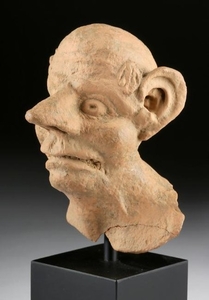Greek Hellenistic Terracotta Grotesque Bust - Comedy
Greece, Hellenistic period, ca. late 4th to 2nd century BCE. A charming head, neck, and partial chest of a "grotesque" figure, with a bald head, deeply furrowed brow, giant ears and nose, small eyes, and a mouth in a deep grimace. Small tufts of hair are depicted at the temples. Grotesque depictions from the Hellenistic period are believed to relate to the tradition of New Comedy - the Greek form of situational comedy and comedy of manners, most notably written by Menander, Philemon, and Diphilus. A particular stock character from the New Comedy is Parasite, who according to the Oxford Classical Dictionary, plays this role: "Parasites attach themselves to their social superiors for their own advantage, above all for free meals; in return they flatter or entertain their patron, run errands, and suffer much ill-treatment." We know that they are often depicted as bald, middle-aged, and beardless, usually with a large nose and knitted brow - so this head likely represents this stock character. Size: 3.2" W x 4" H (8.1 cm x 10.2 cm); 6.55" H (16.6 cm) on included custom stand.
See a similar, but more crude, example at the Metropolitan Museum of Art: https://www.metmuseum.org/art/collection/search/252978
Provenance: private East Coast, USA collection
All items legal to buy/sell under U.S. Statute covering cultural patrimony Code 2600, CHAPTER 14, and are guaranteed to be as described or your money back.
A Certificate of Authenticity will accompany all winning bids.
We ship worldwide to most countries and handle all shipping in-house for your convenience.
#146207
Condition Report: This is a fragment from a larger sculpture, lost below the shoulders. A small area of the neck has been repaired; otherwise it is in very nice condition, with well preserved details and light deposits on the surface.
View it on
Sale price
Estimate
Time, Location
Auction House
Greece, Hellenistic period, ca. late 4th to 2nd century BCE. A charming head, neck, and partial chest of a "grotesque" figure, with a bald head, deeply furrowed brow, giant ears and nose, small eyes, and a mouth in a deep grimace. Small tufts of hair are depicted at the temples. Grotesque depictions from the Hellenistic period are believed to relate to the tradition of New Comedy - the Greek form of situational comedy and comedy of manners, most notably written by Menander, Philemon, and Diphilus. A particular stock character from the New Comedy is Parasite, who according to the Oxford Classical Dictionary, plays this role: "Parasites attach themselves to their social superiors for their own advantage, above all for free meals; in return they flatter or entertain their patron, run errands, and suffer much ill-treatment." We know that they are often depicted as bald, middle-aged, and beardless, usually with a large nose and knitted brow - so this head likely represents this stock character. Size: 3.2" W x 4" H (8.1 cm x 10.2 cm); 6.55" H (16.6 cm) on included custom stand.
See a similar, but more crude, example at the Metropolitan Museum of Art: https://www.metmuseum.org/art/collection/search/252978
Provenance: private East Coast, USA collection
All items legal to buy/sell under U.S. Statute covering cultural patrimony Code 2600, CHAPTER 14, and are guaranteed to be as described or your money back.
A Certificate of Authenticity will accompany all winning bids.
We ship worldwide to most countries and handle all shipping in-house for your convenience.
#146207
Condition Report: This is a fragment from a larger sculpture, lost below the shoulders. A small area of the neck has been repaired; otherwise it is in very nice condition, with well preserved details and light deposits on the surface.



